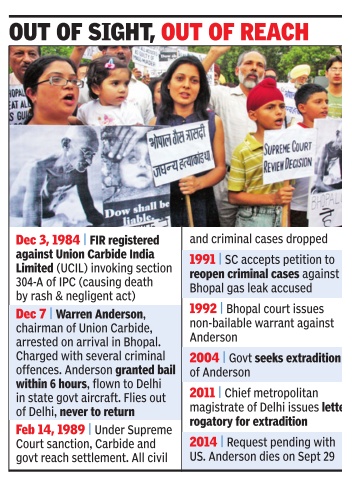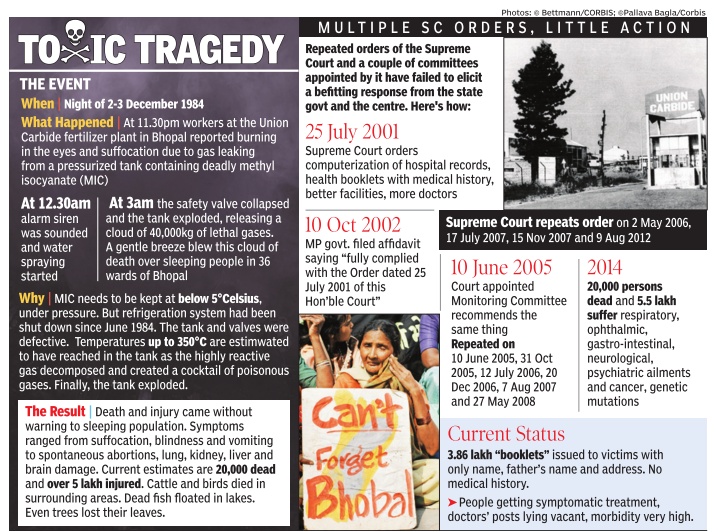Bhopal Gas Tragedy, 1984
m (Pdewan moved page Bhopal Gas Tragedy to Bhopal Gas Tragedy, 1984 without leaving a redirect) |
Revision as of 14:46, 3 December 2014
This is a collection of articles archived for the excellence of their content. |
Lifelong medical aid
LEAK THAT GASSED A GENERATION
Subodh Varma The Times of India Dec 03 2014
MP Govt Sits On SC orders for 13 Years
After 17 years, on July 25, 2001, SC ordered that I-cards be issued to gas victims, and permanent cards given to those who need lifelong medical aid. It ordered that medical records be computerized and booklets containing medical history be given to victims.This'd ensure proper treatment to all victims. The court repeated the order on May 2, 2006, July 17, 2007, November 15, 2007 and August 9, 2012.
A court-appointed monitoring committee made the same recommendations on June 10, 2005, Oct 31, 2005, July 12, 2006, Dec 20, 2006, Aug 7, 2007 and May 27, 2008. An advisory committee said the same.
A report submitted by the monitoring panel in June 2014 says: “So far as computerization is concerned .......the same isn't satisfactory and isn't patient-centric, it doesn't appear useful in affording history of treatment of patients when they approach doctors“. This mean no medical history is available on the digital database. “Issuance of health booklets to patients is inadequate,“ the monitoring committee says. The so called booklets contain name, father's name, address, but no medical information. Thirty years after the disaster, over 5.5 lakh survivors suffer from ailments and disability and are susceptible to diseases.The Indian Council of Medical Research's recent survey of affected people says morbidity, that's prevalence of disease among gas victims, is “21.5% in severely exposed areas, 17.2% in moderately exposed and 18.1% in mildly exposed areas, higher than 8% morbidity in control areas.“
In 2012, SC noted that 80% of specialist and 30% of doctors' posts were vacant in gasrelief hospitals. Besides hampering treatment of patients, this helps unscrupulous operators peddle treatments and spurious drugs, activists say.
Why are medical records important? The main reason is that survivors getting sympto matic and palliative treatment across hospitals and outreach centres are shunted from one place to another. Doctors don't know the medical history and only superficial treatment is given, activists say .
Another issue linked to the health booklets and digitization is that it'd clearly identify the nature of disability suffered by each victim and determine their numbers. This'd be essential for further compensation payments, as are expected, and as the Centre has sought in a 2010 petition in SC. This curative petition seeks to amend the 1986 SC-supervised settlement between the Centre and Union Carbide that led to a paltry compensation. The story of this petition is another of those legal riddles that forms part of the Bhopal bhool-bhullaiya. Even after filing of the petition four years ago, not one hearing has been held. Dates are fixed and cancelled. Sometimes months pass by with no date fixed, says N D Jaiprakash, an activist involved in Bhopal cases for the three decades.



